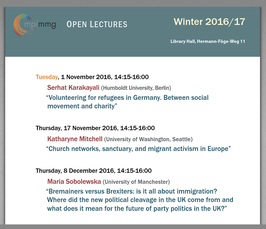"From migrant integration towards diversity mainstreaming? Between concept and (urban) reality"
Open Lectures Summer 2017
- Date: Jun 15, 2017
- Time: 02:15 PM - 04:00 PM (Local Time Germany)
- Speaker: Peter Scholten (Erasmus University Rotterdam & IMISCOE)
- Peter Scholten is Associate Professor for Public Policy at Erasmus University Rotterdam and director of IMISCOE, Europe’s largest academic research network in the area of international migration, integration and social cohesion. His work focuses on the governance of migration and migration-related diversity, on multi-level governance, and on the interaction between research and policy-making in the area of migration. Peter has published in various international journals and recently published the book ‘Politics of Migration and Immigration in Europe’ together with Andrew Geddes. Also, he is editor in chief of the journal Comparative Migration Studies and member of the editorial board of the Journal of Comparative Policy Analysis. For more information, see www.peterscholten.eu
- Location: MPI-MMG, Hermann-Föge-Weg 11, Göttingen
- Room: Library Hall

For more details please contact buethe(at)mmg.mpg.de.
After the multiculturalism backlash and the assimilationist turn in many European countries, countries and cities now seem to be ‘mainstreaming’ their policies regarding migration-related diversity into generic policies. Rather than target-group specific and often ad-hoc policies, such policies would be structurally embedded in generic policy areas and target the whole diverse population. But what does the concept of mainstreaming actually imply, and can we indeed identify a trend toward mainstreaming in various settings? Based on a broad European research project on governance mainstreaming in the area of migration-related diversity, I will critically analyse and discuss the concept of mainstreaming. The aim is to contribute to a further theorization of mainstreaming; how does it relate to interculturalism and superdiversity, in what settings might mainstreaming be relevant, and what are the drivers of mainstreaming in the first place?